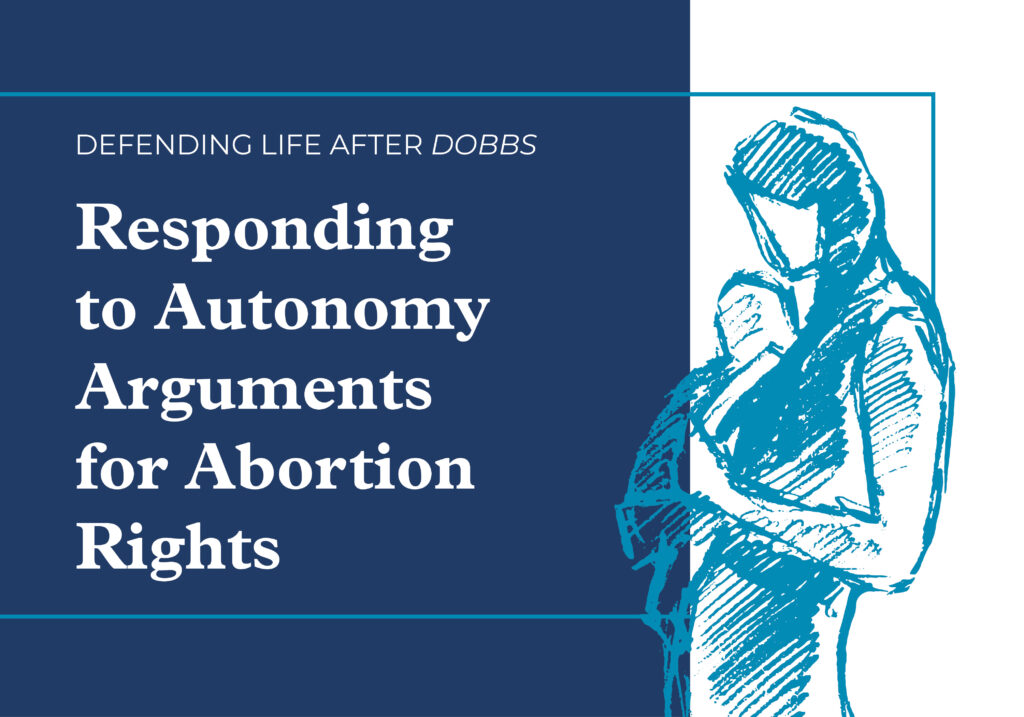
Published July 19, 2023
Arguments to recognize a constitutional right to elective abortion—whether grounded in notions of privacy, liberty, or equality—tend to take their bearing from long-standing common-law protections for bodily integrity and more recent constitutional protections for decisional and bodily autonomy. But autonomy is an inapt legal and philosophical concept to employ in cases concerning elective abortion. A pregnant woman is not physically autonomous; she is carrying another human being within her. To frame the issue as one concerning decisional and bodily autonomy is to offer an erroneous account of pregnancy biologically, philosophically, and legally.
The Kansas Supreme Court’s decision in 2019 finding a “natural right” to abortion in its state constitution represents one recent and lengthy attempt to ground the supposed right to abortion in protections for autonomy. According to the court, the Kansas constitution’s protection of “equal and inalienable natural rights” included, in the words of the court, “the ability to control one’s own body, to assert bodily integrity, and to exercise self-determination,” which in turn included a right to abortion.
More recently, the Supreme Court justices’ dissent in Dobbs v. Jackson Women’s Health Organization relied on what legal scholars Erika Bachiochi and Rachel Morrison have called “Fourteenth Amendment liberty as equal autonomy” to rationalize their position. (The justices in the plurality decision in Planned Parenthood v. Casey, whose logic the dissent tracks, likewise pointed to constitutional protections for decisional and bodily autonomy.) These autonomy-oriented opinions undoubtedly provide a model for state courts, some of which, thus far, seem inclined to use this rationale as grounds to strike down state pro-life laws.
The Kansas court explicitly turned to John Locke’s natural-rights philosophy in interpreting the state constitution. Arguing rightly that Locke grounds liberty rights in self-ownership (“Every Man has a Property in his own Person”), the court wrongly maintains that this right extends to intentionally ending the life of one’s unborn child. The Kansas court disregards that Locke also argues that both mothers and fathers owe duties to “preserve, nourish and educate [children] they had begotten.”
Though not mentioning Locke explicitly, the Dobbs dissent similarly employs Lockean language when it states that “everyone, including women, owns their own bodies.” But even as our law rightfully holds that (setting aside the case of self-defense) each person must determine for herself what happens to or in her own body, our law is also clear that one cannot own another’s body. As legal scholar Adam McLeod explains, the concept of bodily integrity is “a product of a [common law] legal doctrine, the law of battery, from which is derived the doctrine of informed consent.”1 The right not to suffer interference with one’s body—as “owner” of one’s body, in Lockean terms—involves the right to refuse medical treatment or interventions but not the right to obtain such interventions, as is the case with elective abortion.
Framing the issue of elective abortion as one concerning women’s decisional or bodily autonomy ignores the biologically existential relationship of dependency the prenatal human being—genetically, the woman’s child—has upon the pregnant woman—genetically, the fetus’s mother. It also requires deciding, without saying so explicitly, that the pregnant woman has no responsibility to the unborn child developing inside her, a responsibility that parents generally have to their dependent children (e.g., fathers are not legally permitted to end the lives of their unborn children).
What is more, this mistaken line of reasoning replaces the female-bodied sexual and reproductive experience with the male-bodied experience: both a man and a woman produce the new human being, but only the man can choose with full physical autonomy from the dependent child whether to affirmatively offer prenatal parental care. By contrast, once pregnant, a woman’s body has already begun sustaining a new human life. In short, to imitate the male-bodied “choice” not to offer care—to exercise her full “autonomy”—the pregnant woman must, unlike a man, engage in the life-destroying act of abortion.
To define human beings for the purposes of our law as fundamentally autonomous is not to state a fact; it is to make a philosophical judgment that is hard to square with the interdependence of every human being’s life, especially at our vulnerable beginnings and endings.
For further reading:
- Erika Bachiochi and Rachel Morrison, “Dobbs, Equality and the Contested Meaning of Women’s Rights,” submitted law review article (in press, 2023).
- Erika Bachiochi, “What Makes a Fetus a Person,” New York Times, July 1, 2022, https://www.nytimes.com/2022/07/01/opinion/fetal-personhood-constitution.html.
- Elizabeth Kirk, “The Kansas Supreme Court Has Declared a ‘Natural Right’ to Abortion,” Public Discourse, May 8, 2019, https://www.thepublicdiscourse.com/2019/05/51839/.
Endnotes:
- Adam McLeod, “The Case of Stolen Jurisprudence in Kansas,” Public Discourse, June 12, 2019, https://www.thepublicdiscourse.com/2019/06/52774/.












